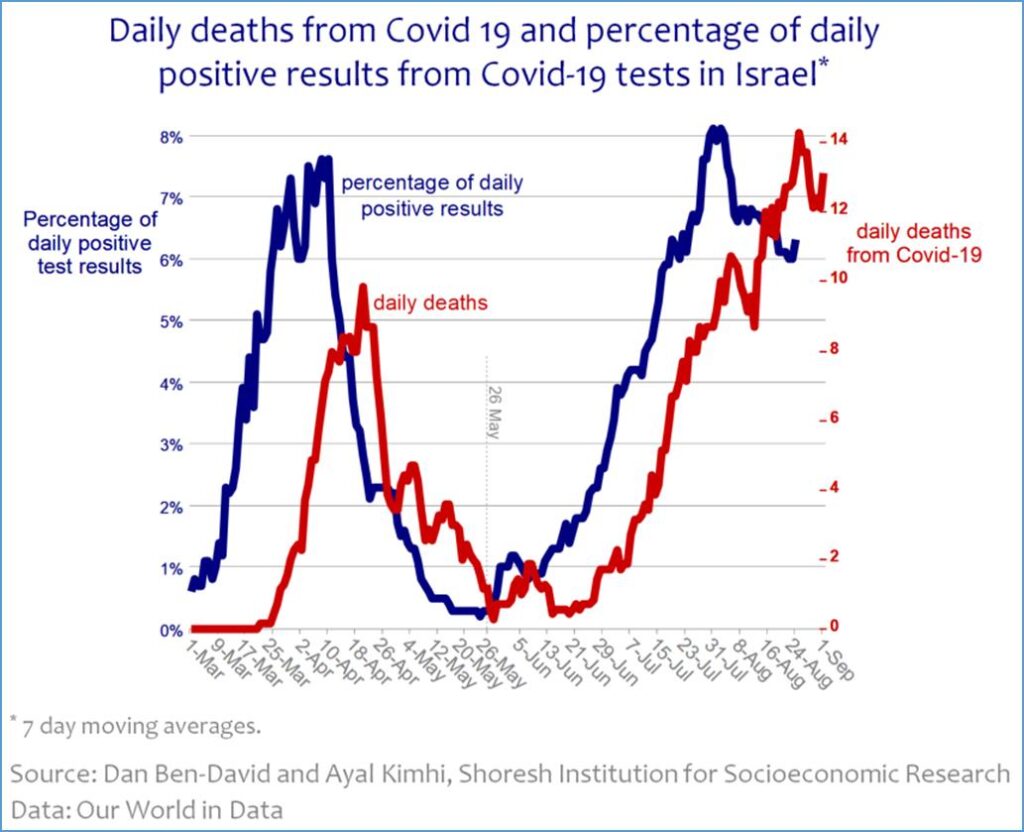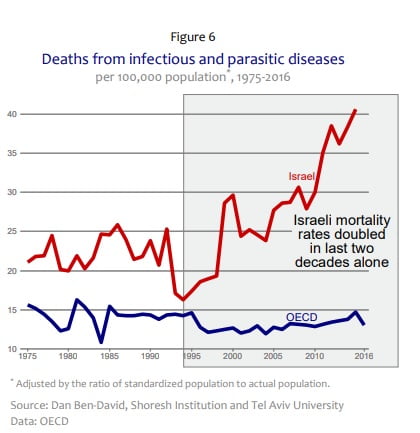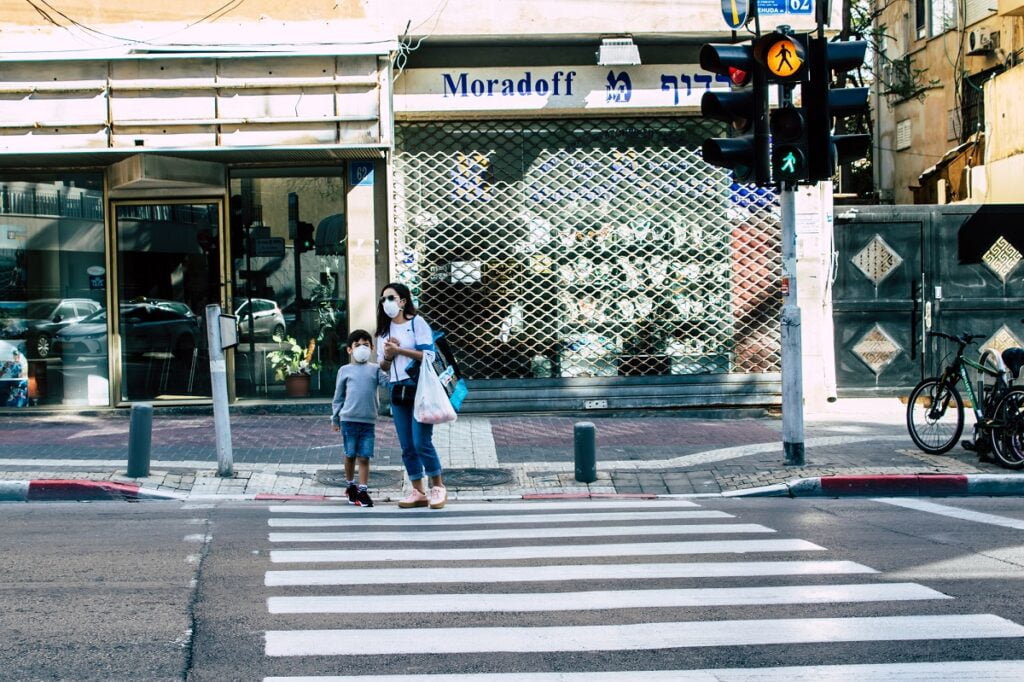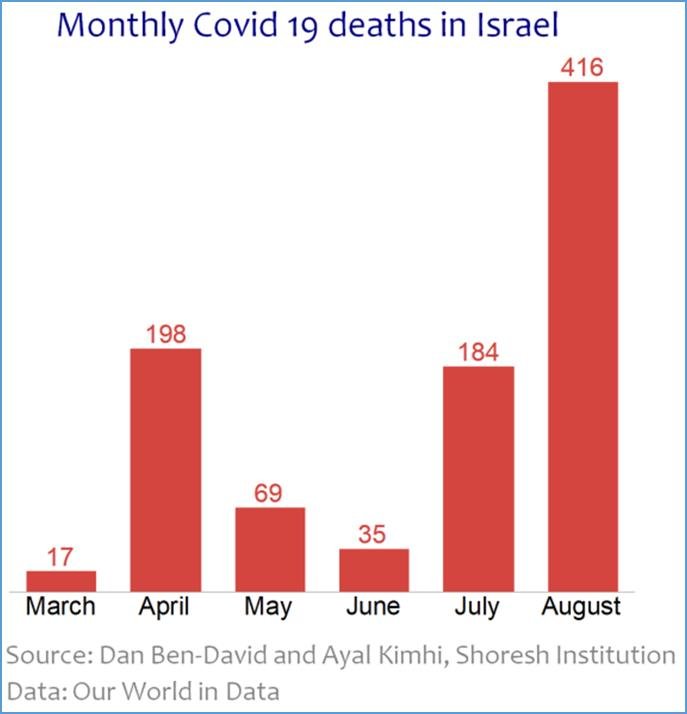If all goes as planned this Friday, Israel will become the first developed country to impose a second nationwide COVID-19 lockdown to try and curb the spread of the novel coronavirus. While the prime minister announced earlier this week that rising infection rates leave no choice but to initiate another shutdown, a new study by the Shoresh Institution for Socioeconomic Research shows the coronavirus chaos in Israel won’t abate until there’s a national coronavirus strategy.
“We’re stumbling into the second lockdown instead of entering it with clear entrance and exit strategies. The government has not put forth any coherent policy detailing their long term strategy for dealing with a pandemic that will continue to be highly contagious and deadly,” pending a vaccine, Professor Dan Ben-David, an economist at Tel Aviv University’s Department of Public Policy and head of the Shoresh Institution for Socioeconomic Research, tells NoCamels.
SEE ALSO: Early Results For COVID-19 Trial With Antibody Drug Show 90% Improvement Rate
Israel has created an awkward name for itself during this COVID-19 health crisis. On the one hand, this country’s entrepreneurs are wowing the world with adaptive tech solutions for the healthcare arena that can be found in use in hospitals the world over.
On the other hand, the country’s lack of strategy for navigating this deadly virus has become a warning for others around the world as to what happens when you don’t have a plan and try to return to “normal” too quickly.
Israel’s first coronavirus lockdown
In late February, the first novel coronavirus cases were recorded in Israel. In March, Israel became one of the first countries hit by the coronavirus crisis to go into a national lockdown. The news showed horrors in Italy, Spain and then New York as they battled against the novel coronavirus.

“We can’t avoid a worldwide pandemic. When we closed the country in the spring, we had the opportunity to prepare for the future. We knew that there wasn’t going to be a vaccine until the end of the year, at least, and we knew that the virus wasn’t going to get any less infectious,” Ben-David tells NoCamels. “We could have planned for this in advance.”
In April, the Shoresh Institution for Socioeconomic Research put out an outline of how Israel could utilize its unique features to get rid of the virus within its borders. A number of other “exit strategy” plans were penned by scientists, researchers and entrepreneurs on how to emerge from the lockdown.
According to the report, Israel’s health system entered the COVID-19 pandemic with the developed world’s most overcrowded hospitals, a small healthcare workforce, and the highest mortality rates from infectious diseases than other developed countries due to continued neglect and mismanagement of its healthcare system.
“In the first wave, we reacted as we did because we had no choice. Not only are we the number one country in the developed world in terms of people dying from infectious diseases, we’re 69 percent above the number two country, we’re on a different graph altogether,” Ben-David says.

“When this thing hit, this is the Uber of infectious diseases, we’re already in a terrible situation in this regard, we had no choice but to clap down before we outdid Italy.”
But while the citizens of Israel stayed at a social distance, for the most part, the government acted against their own regulations.
“When people saw on the news the alternative is Italy, Spain, New York, it was clear why we need to be closed down. But we also saw during Passover that the country’s leaders are ignoring the same rules they force on us, so maybe it’s not so serious,” says Ben-David.
The “yihye beseder” (“it will be okay”) attitude, so deeply rooted in Israeli culture and which is anything but comforting, started to creep back into the daily conversation – both from a governmental point of view and amongst citizens. “There’s no reason to believe ‘yihye beseder’ but that’s the way things operate,” says Ben-David.
Sign up for our free weekly newsletter
SubscribeA lost opportunity to prepare for the second wave
The Shoresh report shows that 198 people died from COVID-19 in April, and that number fell to 69 in May and 35 in June. Today, there are over 3,100 new recorded infections daily and over 1,100 people have died of the disease. More than 500 people are currently in serious condition.
“When we closed things down, that was our opportunity to prepare and get rid of the virus within Israel. That was the first thing that should have been done and didn’t get done. And then on May 26, when things were at their best, the prime minister went out and said, ‘go enjoy life.’ There was no contingency plan. The virus didn’t stop becoming contagious or deadly,” he says, noting in the report that following the prime minister’s public green light for the population to return to its daily routines infections shot up, reaching eight percent in August.

Unsurprisingly, compliance has also changed and it will be interesting to see how the population reacts to a second lockdown.
“The situation has changed in the second wave. While predominantly Haredi [ultra-Orthodox] municipalities are still among the most infected municipalities, they have been joined at the top of the distribution by many Arab-Israeli municipalities with very high infection rates,” write Ben-David and Prof. Ayal Kimhi, authors of the Shoresh study, Anarchy at the helm with COVID-19 on deck.

“The difference between the first and second waves may be rooted in behavioral changes. The complete lockdown during the first wave yielded a sense of emergency resulting in higher compliance with government orders almost everywhere – except the religious boarding schools – including in the Arab-Israeli sector. The evidently-too-rapid exit from the lockdown alongside the very inconsistent and contradictory government policies and statements has since led to considerably less compliance during the second wave. This was particularly true in the Arab-Israeli sector, with mayors of several large Arab-Israeli towns publicly testifying to this effect,” the authors write.
‘Governmental anarchy’
The study’s authors warn that Israel is on the verge of self-implosion because of what they call government anarchy.
“Israel’s governmental anarchy is occurring during one of the worst crises in Israel’s history. Cabinet meetings, held weekly even during periods of wars, are being habitually canceled week after week. No budget for the country is in the offing while the country’s top civil servants from across the spectrum, from the economic through the health to the law enforcement and judicial systems are coming under increasing personal attacks by the very politicians who appointed them,” they write.
Case in point was the July appointment of Prof. Ronni Gamzu, CEO of Tel Aviv Sourasky Medical Center, to lead the country’s efforts in combatting the virus – five months after the COVID-19 outbreak in Israel. “The government is still unwilling to define what powers and what authority Gamzu has to actually deal with the epidemic. As a result, there is an incessant flow of contradictory directives by leading cabinet ministers – not to mention persistent calls for his resignation from top politicians from the ruling party – that undermine his ability to manage the government’s efforts,” reads the report.

SEE ALSO: Israeli Data Scientist Suggests ‘End of Coronavirus Peak’ Is Near
“We don’t know where our leadership wants to go, how they want to get there – and there are some fairly clear indications that for the past six and a half months since this [pandemic] hit Israel, the person leading the country has extraneous interests that override any of his thinking in this regard,” Ben-David tells NoCamels.
“So we’re like a national pinball machine, bouncing from one directive that smacks us to the next, and hoping that someone will save us from Israel’s worst governance vacuum during its worst health crisis and economic recession on record,” he charges.
And the ostensibly comforting catchphrase “yihye beseder” is not encouraging.
Viva Sarah Press is a journalist and speaker. She writes and talks about the creativity and innovation taking place in Israel and beyond. www.vivaspress.com
Related posts

Israeli Medical Technologies That Could Change The World

Harnessing Our Own Bodies For Side Effect-Free Weight Loss

Missing Protein Could Unlock Treatment For Aggressive Lung Cancer




Facebook comments